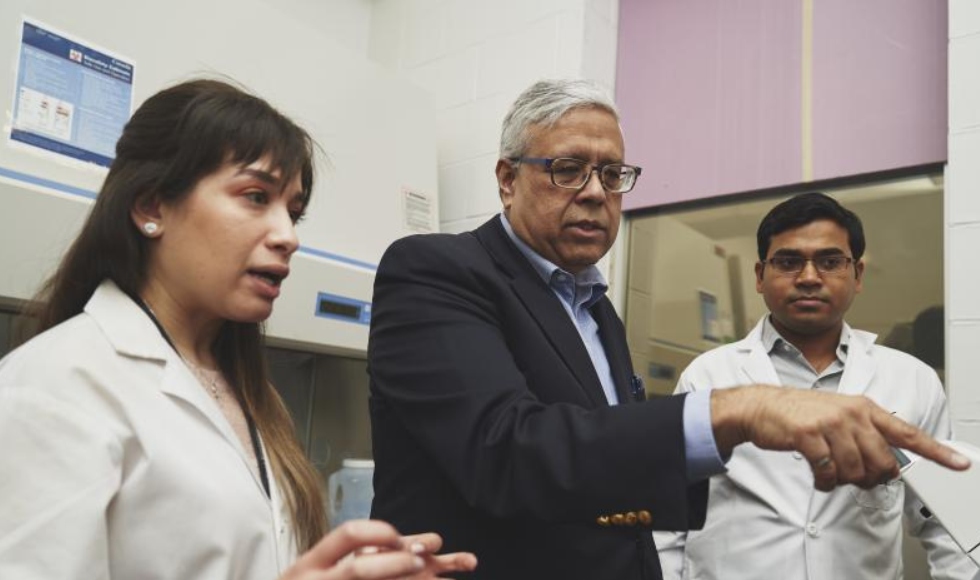McMaster engineers bringing to market at-home test to detect COVID-19 antibodies and 3D cell printing technology

Researchers Sarah Mishriki, Ishwar K. Puri and Rakesh Sahu are part of a team that has developed a rapid-detection kit for COVID-19 antibodies, and pivoted their 3D printing technology to aid in drug screening. Photo taken in March 2019 by Jin Lee.
BY Jessie Park, Faculty of Engineering
July 27, 2020
What if people could take an easy-to-follow home test to screen for COVID-19 antibodies or other viral infections, instead of going out into the community?
Could there be a way to 3D-print human cells to test different drug therapies – and could this be used in COVID-19 research?
A team of McMaster researchers are aiming to make these two technologies widely available for research and community use soon.
Led by Ishwar Puri, Dean of Engineering, the team has been “sprinting” to create these products since March and have recently launched a startup company called Makers and Solvers.
The rapid-detection kit for COVID-19 antibodies takes a small blood or saliva sample and uses reagents to “wash away” all biological material in the sample except the specific antibody in question – in this case, the SARS-CoV-2 strain of coronavirus which causes COVID-19.
If the antibody is present in the sample, the colour of the kit will change from clear to either blue or yellow.
“We have a product that is more sensitive and more specific than other antibody tests on the market – the innovation of our method makes it a product that doesn’t give false positive results,” says Puri, who is also a professor of mechanical engineering.
Learn more about this research on Big Ideas for a Changing World, a podcast produced by the Faculty of Engineering:
In collaboration with researchers in the Faculty of Health Sciences, the product will enter clinical trials using blood samples from donors which are being “spiked” with COVID-19 antibodies.
Looking beyond the current pandemic, the testing kit can be modified to target other diseases, such as the flu and diseases in animals, including in the poultry industry.
“This is just the beginning. These are not just products, but they’re platforms which could be translated into addressing different needs as they come up,” says Rakesh Sahu, research associate and adjunct assistant professor in the department of materials science and engineering.
The team’s 3D cell printing technology creates artificial human cells and tumours to help researchers test new drugs and therapies, which could lead to personalized medicine.
“We believe that our technology will be useful to study the COVID-19 pathophysiology in an in vitro setting and serve as a platform to test new drugs against this infectious disease,” says Tamaghna Gupta, a PhD candidate in the research group.
Once robotics are integrated into the technology, hundreds of thousands of cells can be printed in a three-hour period, whereas standard methods can take days or weeks to create these cells, says Puri.
“The most exciting part of this work is the opportunity to transform the way we detect, research and potentially treat disease,” says PhD Candidate Sarah Mishriki.
“Whether it be to contribute to a solution to cancer or aiding the efforts of the current pandemic, multidisciplinary teams such as ours are critical.”
Their research in 3D cell printing was recently accepted for publication in Research, a Science Partner Journal, Physics of Fluids and ACS Biomaterials Science and Engineering.
“A special characteristic of McMaster and Canada is that one is able to reach out to individuals across the university or in different institutions and forge relationships that can then lead to exciting projects, other forms of funding, startup ideas and more,” says Puri.
“The journey has been very enriching – and if the journey is any indication of future success, I think the future is very bright.”
Big Ideas for a Changing World is available on Spotify, YouTube, Apple Podcasts and Google Podcasts.


